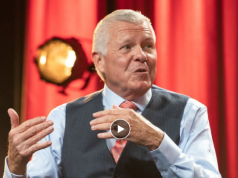Partners and crewmates come in all different shapes, sizes and personalities. There are a lot of good ones out there, but then there are others who will try your patience and test your ability to officiate nice, because their “offenses” are pretty bad. You probably have or will run across all of them during your career. … Hopefully it’s not because you’re seeing one in the mirror.
In life and officiating, you can’t always choose who you work with. So you have to deal with it. Since we’ve run across our share of unique officials working games in various sports, we’ll pass along some sure-fire counterattack plans you can apply if Grouchy Greg or Clyde the Clown walks into your locker room before a game.
Dominator Dan
![]() This guy is part control freak, part loudmouth and part overconfident. He dominates the pregame with partners, dominates in the pregame meeting with coaches and, of course, makes every effort to insert himself and dominate in the game.
This guy is part control freak, part loudmouth and part overconfident. He dominates the pregame with partners, dominates in the pregame meeting with coaches and, of course, makes every effort to insert himself and dominate in the game.
If there is a problem in the game, even if Dan is remotely a part of the problem, he will “come to the rescue” whether welcomed or not and, in his eyes, save the day. Dan’s listening, but he really isn’t. He’ll do it his way always.
Counterattack
Do what you can to get a few words in during your pregame. Even if Dan doesn’t end up really listening, it’s important to at least try to get through to him. Conduct yourself in a professional manner, even if Dan doesn’t get the concept. It’s OK to let him have control, as long as he isn’t doing anything wrong. If he does and the rules permit a correction, it’s your responsibility to step up and play superhero, whether Dan likes to share the spotlight or not.
Techie Ted
![]() He is an enthusiast who is highly proficient about the technical field and how it relates to officiating. Ted’s smart phone has all the officiating information he needs to receive assignments, view video, take tests, study and communicate with other officials and assigners. That is all great. The problem is he is on his device all the time, checking email, texting and searching the Internet. He says he’s listening during the pregame and postgame, but it’s hard to tell because the latest text message from a friend or family members has his attention as well.
He is an enthusiast who is highly proficient about the technical field and how it relates to officiating. Ted’s smart phone has all the officiating information he needs to receive assignments, view video, take tests, study and communicate with other officials and assigners. That is all great. The problem is he is on his device all the time, checking email, texting and searching the Internet. He says he’s listening during the pregame and postgame, but it’s hard to tell because the latest text message from a friend or family members has his attention as well.
Counterattack
A partner with the latest in officiating technology is a positive. Use that technology as part of your pregame, showing video or utilizing a pregame board. If you’re not using technology in your pregame, make the extra effort to engage Ted more in the discussion. It doesn’t hurt to flat out ask him to put the device away. There may be some withdrawal shaking at first, but eventually Ted will be OK, and your prep for the game will be a lot better.

Give-Me-My-Paycheck Peter
![]() Pay me now or pay me now, preferably in cash. In Peter’s world, there really is no good reason why a school or organization doesn’t show him the money the moment he pulls into the parking lot. And if the game administrator doesn’t have a check ready and waiting, Peter will politely joke (but not really) how it sure would be nice to have received a check on game day, then ask when he can expect to receive the check.
Pay me now or pay me now, preferably in cash. In Peter’s world, there really is no good reason why a school or organization doesn’t show him the money the moment he pulls into the parking lot. And if the game administrator doesn’t have a check ready and waiting, Peter will politely joke (but not really) how it sure would be nice to have received a check on game day, then ask when he can expect to receive the check.
For Peter, getting his hands on the check is seemingly more important than the game itself. His passion for collecting checks and cash on game days often supersedes his ambition to officiate.
Counterattack
There is nothing wrong with officiating to earn money, but a passion for the game and exhibiting professionalism for those surrounding the game are also important. Asking Peter why he started officiating might help to bring him back to the love of the game that probably got him into the avocation to start with.
Sal the Slob
![]() You walk into the locker room with your neatly packed roller bag. You shined your shoes twice last night. Your pants are pressed. You even took the time to iron a crease into the sleeve of your striped shirt. You’ve heard it before — perception is reality. You’re controlling the things you can control; you’re really looking the part! As you begin to unfold your meticulous uniform, your partner barrels through the door in one big dust cloud.
You walk into the locker room with your neatly packed roller bag. You shined your shoes twice last night. Your pants are pressed. You even took the time to iron a crease into the sleeve of your striped shirt. You’ve heard it before — perception is reality. You’re controlling the things you can control; you’re really looking the part! As you begin to unfold your meticulous uniform, your partner barrels through the door in one big dust cloud.
“Hey there, name’s Sal!” bellows your partner as he extends his mustard stained hand. Sal looks frazzled at best. His hair is a mess, his dirty shirt is partly tucked in and it’s obvious his holey and untied shoes have seen one too many Guns N’ Roses concerts. Absolutely zero attention has been paid to his unkempt appearance and it quickly becomes evident that he does not care one bit. He unzips his bag and pulls out a balled-up shirt that looks like it hasn’t been washed since opening day, three years ago.
Counterattack
We might be embarrassed working with Sal, or be embarrassed for him. Part of being a (successful) sports official means taking pride in one’s appearance. Being a good partner might mean casually speaking up in the locker room before the game. “You know Sal, I’ve learned that my shirt best stays tucked in when I tuck it in my tights.” Unfortunately, having to take the floor with Sal can give a negative first impression of the entire crew. Expect it, and plan to work that much harder to gain respect.
Grouchy Greg
![]() “Can you believe they gave him the championship game this year!? I can’t believe it, it’s all soooo political! I guess I gotta kiss more butt.”
“Can you believe they gave him the championship game this year!? I can’t believe it, it’s all soooo political! I guess I gotta kiss more butt.”
Ahh, the always-exasperated Greg has entered the building. Some people see the glass as half-full, some see it as half-empty; Greg sees the glass as all-angry. The sun may be shining outside, but it is always miserable in Greg’s world. “I don’t know about you but I can’t stand this coach, he’s a real piece of work.” Greg’s partners often aren’t exempt from his wrath either. “Why do you guys go to those clinics anyway, you don’t learn a darn thing from those knuckleheads!”
From the weather being too cold, to the game check not sitting next to the water bottle and towel as you enter the locker room, Greg will always have that negative attitude: “All right, let’s get out there and get this thing over with.” For everything wrong in Greg’s world, someone else is always to blame. Heaven forbid it is ever his own fault.
Counterattack
Kill him with kindness. For every angry and negative comment, reply with something positive. Don’t stoop to Greg’s level; that just gives him more ammunition. Nothing can wear you out quicker than the guy who is negative 24/7. Our officiating careers (and life in general) are too short to be mad all the time. Ask Greg why he officiates? If everything is so awful and bad and wrong, ask him why he continues to do it if it makes him so miserable? Maybe you’ll finally hear something positive come out of his mouth.
Just-in-Time Terry
![]() Everything is last-minute for Terry. She’s the one who shows up 15 minutes prior to a game, even though she isn’t coming from work. Because you don’t want to walk on the field without her, you are taking the field late, making coaches wonder if you are even there.
Everything is last-minute for Terry. She’s the one who shows up 15 minutes prior to a game, even though she isn’t coming from work. Because you don’t want to walk on the field without her, you are taking the field late, making coaches wonder if you are even there.
If there’s paperwork to be filed, Terry’s waiting to the last minute as well. And then when her email system is down or she can’t find a fax machine or scanner that works, it’s your fault that her form isn’t in. And you are expected to understand that the world has to work on Terry’s time — Terry is a very important and very busy person and without her, things just wouldn’t be as good.
Counterattack
As long as everyone continues to cater to Terry, then Terry will never change. Deadlines must be enforced. Late arrivals must be pointed out to assigners. And even most drastically, go to the field at the right time, and let Terry be late. You can’t let Terry drag you down.
The first time Terry doesn’t get a playoff game because she inadvertently didn’t get the test taken on time, she’ll learn the importance of meeting the deadline. And when enough partners call the assigner or report back on an evaluation that she was late to the site and isn’t doing a proper pregame, it will start to hurt her schedule.
Everyone runs late every once in a while. But if Terry’s always behind and always pushing things to the very last minute, it’s going to look very bad for her eventually. Be proactive and don’t let Terry dictate your schedule or the way you do things.
Captain Obvious Orv
![]() Orv oversells everything and must be seen doing it. The over-the-shoulder out pump when the play wasn’t close. The dramatic long whistle followed by the over-exuberant touchdown signal when everyone knows it was a score. Or the screaming of “FOUL BALL!” when it flies quickly over the fence behind the plate and into the parking lot.
Orv oversells everything and must be seen doing it. The over-the-shoulder out pump when the play wasn’t close. The dramatic long whistle followed by the over-exuberant touchdown signal when everyone knows it was a score. Or the screaming of “FOUL BALL!” when it flies quickly over the fence behind the plate and into the parking lot.
Orv makes it a point of explaining even the most basic calls to players, coaches and even fans. He wants to make sure everyone knows that he knows what he knows and that he saw what he saw. Of course, then when Orv has to really sell a call, his credibility is in question because he can’t do anything more dramatic than he did for the super obvious calls.
Counterattack
Find someone that Orv looks up to and get that person to mentor Orv. Have Orv watch how officials at the higher levels and respected officials at his level use other techniques to command a game. Orv is probably a pretty good official who just hasn’t been shown or doesn’t realize the harm he is doing to himself by overselling the obvious calls.
Big-timer Bob
![]() Bob isn’t shy about relating his experiences to people, selling himself based on the levels he’s worked, not his actual ability. In a meeting of high school officials, he’s not afraid to tell people, “This is how I do it when I work a college game.” Or, “This is how we did it when I worked with that professional official.”
Bob isn’t shy about relating his experiences to people, selling himself based on the levels he’s worked, not his actual ability. In a meeting of high school officials, he’s not afraid to tell people, “This is how I do it when I work a college game.” Or, “This is how we did it when I worked with that professional official.”
Bob is also known to cite the experiences of his friends. “My buddy Larry told me that his crew in the college conference does it this way.”
Bob thinks the levels he’s worked means that he should get automatic respect at the lower levels and that his ways are always the best.
Counterattack
Put Bob in his place. Respectfully stand up to him and let him know that what is important is how we do it at our level and the proper rules, mechanics and philosophies for our level.
If your association has too many Bobs, it can fracture the association. People will want to do it Bob’s way, or worse yet, will want to adopt their own “higher level” mechanics. Soon, there will be no consistency in the way games in your association are called.
Long-for-the-Good-Ol’-Days Larry
![]() Remember when gas was 50 cents a gallon? When a portable communication device was two tin cans and a length of string? When the games lasted only an hour and 15 minutes and the coaches never complained about the calls?
Remember when gas was 50 cents a gallon? When a portable communication device was two tin cans and a length of string? When the games lasted only an hour and 15 minutes and the coaches never complained about the calls?
Larry does, and he reminds you over and over. And over.
He not only regales you with tales of how games used to be officiated, he actually employs those outdated mechanics and philosophies. Rulebooks? He don’t need no stinkin’ rulebooks! One of his favorite questions is, “When did they change that rule?”
Counterattack
For heaven’s sake, don’t enable Larry by asking him to elaborate on any of his stories. If he’s holding court before you hit the court, try to bring him back to the here and now by getting him involved in the pregame discussion. If it’s halftime or after the game, direct the conversation to situations that occurred today.
Clyde the Clown
![]() As you watch both teams warm up, you can’t help but notice your partner Clyde down by the baseline. What the heck is he doing? Clyde is going through an elaborate (and very attention seeking) stretching routine. All of his jumps, twists and turns would make any yoga instructor proud. You shake your head as Clyde yuks it up with players and fans alike. Once the game starts, Clyde’s act doesn’t stop. His foul calls are theatrical and any time he blows his whistle you’re not quite sure what’s going to happen next. Give this guy a red nose and some oversized shoes and you’ve got a real-life clown on your hands.
As you watch both teams warm up, you can’t help but notice your partner Clyde down by the baseline. What the heck is he doing? Clyde is going through an elaborate (and very attention seeking) stretching routine. All of his jumps, twists and turns would make any yoga instructor proud. You shake your head as Clyde yuks it up with players and fans alike. Once the game starts, Clyde’s act doesn’t stop. His foul calls are theatrical and any time he blows his whistle you’re not quite sure what’s going to happen next. Give this guy a red nose and some oversized shoes and you’ve got a real-life clown on your hands.
Working with Clyde can start out as comical and lighthearted, but it can quickly become too much. Clyde is often someone that’s been around awhile — and he has a reputation. Fans laugh at him, coaches tolerate him and partners shake their heads.
Counterattack
When you work with Clyde, it’s best to stick to your game. Don’t change the way you officiate because you’re working with an amateur comedian. Go out and work hard like you always do. Clyde’s antics will eventually catch up with him. You should enjoy officiating, but don’t become a sideshow; just stay focused on the task at hand.
Invisible Ike
![]() Ike shows up for the game on time, looks the part of a solid official and says all the right things in the pregame. You have confidence going into a contest with him, but when it’s game time and the pressure is on, Ike is nowhere to be found. Where’s Ike?
Ike shows up for the game on time, looks the part of a solid official and says all the right things in the pregame. You have confidence going into a contest with him, but when it’s game time and the pressure is on, Ike is nowhere to be found. Where’s Ike?
When there is a crash and a call could go either way, but there should be something, Ike will often no-call it. When a coach is bashing you from the other side of the field or court right in front of Ike, you won’t be able to count on him for backing or for penalties. Ike likes to get through a game with as little controversy as possible by making as few decisions as possible. Ike follows the wrong thinking that “the best officiated games are the ones in which you don’t know the officials are there.”
Counterattack
Ike is a dangerous partner to deal with because he often won’t have your back. Plan on having to step up more during a game. You don’t want to overstep your coverage responsibilities, but at times, you may have to if it’s warranted. Encourage Ike to step up when it’s needed. Go over the importance of having a presence at halftime or after the game. The best officiating games are the ones that are actually officiated. Lead by example and call what needs to be called.

Wanna-Be Willy
![]() Many are called to officiating. Few are chosen for the upper levels. Willy isn’t one of them, but that doesn’t stop him from dressing or acting the part.
Many are called to officiating. Few are chosen for the upper levels. Willy isn’t one of them, but that doesn’t stop him from dressing or acting the part.
To Willy, the approved signals and mechanics aren’t nearly as good as the ones the pros or college officials use. So he goes off the book and does it like the “big boys” do. The manual says white or blue beanbags. But Willy sports the black version used by college officials because he wants to draw attention to himself. The state has a “clean shirt” policy. Willy wears numbers on his sleeve so people will think he’s taking a busman’s holiday from the semi-pro league to work the youth contest.
Counterattack
When Willy is on your crew, let him know in advance he needs to bring the proper uniform and equipment, and that his nonsense will not be tolerated. Bring some extra equipment in case he “forgets,” so the crew can go out looking proper.
Fake-Hustle Harry
![]() Maybe instead of Harry, we should call him Hurry or Harried. That’s because this guy moves like Jell-O in an earthquake. Problem is, all that energy is expended whether or not he’s covering plays. Someone watching Harry gets exhausted as he sprints to his between-innings spot in the outfield after the third out is made, flies from the goalline to his position on a kickoff (never bothering to slow down or stop to clean up the sideline along the way) or imitates Usain Bolt while doing the dreaded (and incorrect) long switch.
Maybe instead of Harry, we should call him Hurry or Harried. That’s because this guy moves like Jell-O in an earthquake. Problem is, all that energy is expended whether or not he’s covering plays. Someone watching Harry gets exhausted as he sprints to his between-innings spot in the outfield after the third out is made, flies from the goalline to his position on a kickoff (never bothering to slow down or stop to clean up the sideline along the way) or imitates Usain Bolt while doing the dreaded (and incorrect) long switch.
Counterattack
Not every Harry understands subtlety, so you may have to (figuratively) hit them over the head when you explain that he is hustling at the wrong times. False hustle is like yelling: If you do it all the time, people won’t be able to tell when you mean it. Harry needs to understand that.
Lackadaisical Len
![]() This character is cool as a cucumber when the heat is on. Or off. Also during the pregame. In fact, sometimes you want to shake him to make sure he’s still awake. Nothing fazes Len. He’s happy to let his partner or crewmates handle anything that may come up during the game. He just wants his check and a quick finish so he can get on with his life.
This character is cool as a cucumber when the heat is on. Or off. Also during the pregame. In fact, sometimes you want to shake him to make sure he’s still awake. Nothing fazes Len. He’s happy to let his partner or crewmates handle anything that may come up during the game. He just wants his check and a quick finish so he can get on with his life.
Counterattack
The remedy would seem to be a swift kick in the slats, but even if it weren’t wrong, it wouldn’t help anyway. Asking Len questions or soliciting his advice will get him involved in the pregame. Engaging him in quick conversations (“How’s my strike zone?” “Did you get a look at the block in the back I called during that kickoff return?” “Is it time for me to give a red card to number 10 if she pops off again?”) when appropriate during breaks in the action may light his fire.
Cocky Carl
![]() Confidence in your officiating abilities is important, but Carl goes beyond confidence. If he is your partner, expect to hear about a great call or two or three that he made in previous games. Expect to hear that the game ahead should be no problem. And with all that talking, expect that having a proper pregame may be difficult. If fact, Carl may not think it is necessary. Many games at the high school level may actually be beneath him. So going through the motions with little focus or energy is something you will regularly see.
Confidence in your officiating abilities is important, but Carl goes beyond confidence. If he is your partner, expect to hear about a great call or two or three that he made in previous games. Expect to hear that the game ahead should be no problem. And with all that talking, expect that having a proper pregame may be difficult. If fact, Carl may not think it is necessary. Many games at the high school level may actually be beneath him. So going through the motions with little focus or energy is something you will regularly see.
You might be a decent official, but Carl will likely know more than you and you can expect to hear his expertise offered in full following the game. There is no need to repay the critique, though. Carl won’t think it’s necessary.
Counterattack
Fight cockiness with humbleness and patience. There are some who can and should put Carl in his place (supervisors, coordinators, etc.), but you don’t need to be one of them. Try to do the right thing by pushing for a pregame and listening to Carl’s advice after the game. Present yourself in a friendly way to coaches and players, so the cockiness that Carl exudes is not reflective of the whole crew. Work hard no matter what the level or score, because Carl likely won’t.
Sam the Schmooze
![]() Coaches, players, supervisors, officials, you name it, Sam will schmooze them. He knows the coaches’ names and nicknames, and probably even their kids’ names. Sam has the gift of gab and he’s not afraid to use it to further himself in a game or his career. Unfortunately the schmoozing doesn’t endear Sam to his fellow officials, because they can see right through it. By chatting up the coaches or complimenting the players after good plays, Sam often presents the crew in a bad light. While he’s an equal-opportunity schmoozer, a particular team often doesn’t see it that way and the objectivity of the officials can be called into question.
Coaches, players, supervisors, officials, you name it, Sam will schmooze them. He knows the coaches’ names and nicknames, and probably even their kids’ names. Sam has the gift of gab and he’s not afraid to use it to further himself in a game or his career. Unfortunately the schmoozing doesn’t endear Sam to his fellow officials, because they can see right through it. By chatting up the coaches or complimenting the players after good plays, Sam often presents the crew in a bad light. While he’s an equal-opportunity schmoozer, a particular team often doesn’t see it that way and the objectivity of the officials can be called into question.
Counterattack
Sam is mostly harmless. If you’re his partner or crewmate, you just need to keep an eye on him and stress the importance of not talking to players and coaches too much during a contest. Sam should have a short leash. If you’re the one he’s complimenting, understand the source and don’t let your head get too big.
Gotta-Go Gabby
![]() There are very few postgame meetings that Gabby can’t weasel her way out of. She can’t stick around, because she has to go to a wedding or a funeral or her husband’s birthday dinner, etc. … You get the idea. Gabby likes officiating games, she likes working with the kids, exercising and getting her paychecks, but getting better is not all that important to her and it shows.
There are very few postgame meetings that Gabby can’t weasel her way out of. She can’t stick around, because she has to go to a wedding or a funeral or her husband’s birthday dinner, etc. … You get the idea. Gabby likes officiating games, she likes working with the kids, exercising and getting her paychecks, but getting better is not all that important to her and it shows.
Counterattack
If Gabby is on your regular crew, make the postgame meetings mandatory. No excuses. If you just happen to have Gabby as your partner once in a while, it might be tough to counter the excuses. The best you may be able to do is try to talk her into at least a short postgame. Whether your partner stays or not, you should at least mentally review your game or watch video later, if available. Make sure improvement is important to you.
Maybe some of your partners look pretty good right now. … Or maybe not. At least you’re armed with some sure-fire ways to handle the bad ones. ∗
What's Your Call? Leave a Comment:
Note: This article is archival in nature. Rules, interpretations, mechanics, philosophies and other information may or may not be correct for the current year.
This article is the copyright of ©Referee Enterprises, Inc., and may not be republished in whole or in part online, in print or in any capacity without expressed written permission from Referee. The article is made available for educational use by individuals.





















